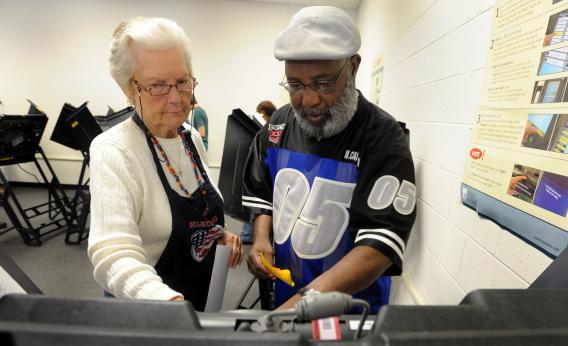Ryan Reilly is all over the details of the new post-election voting reform commission, to be chaired by Obama 2012 attorney Bob Bauer and 2012 Romney (and 2000 Bush) lawyer Ben Ginsberg. For a little while yesterday, this sent voting rights advocates’ hearts aflutter. They regained their balance today, and wonder why Obama didn’t ask for more.
“Setting up a commission is not a bold step,” says the League of Women Voters in a statement. “It is business as usual. The President could have done much better by pointing to real solutions like that in legislation already introduced on Capitol Hill.”
Michael Yaki, a Democratic appointee on the Commission for Civil Rights, took a whack at the idea on Twitter, so I emailed him to ask why he was skeptical.
“Don’t get me wrong, I like the spirit of the commission,” says Yaki. “But limiting jurisdiction to Election Day (which is what I’ve been led to believe based on reports), when the problems on Election Day relate directly to pre-election day voter suppression efforts (i.e., what Ginsberg has been involved with in the past) may make this Election Assistance Commission, part 2.”
The “Election Assistance Commission,” created by the post-2000 Help America Vote Act, came up with a series of recommendations that led to a few solid reforms, like early voting, but did not anticipate the backlash against extra voting days and the persistence of asymmetrical polling booth management from rural areas to cities.
“Without the power to get at the systemic causes of Election Day gridlock, I’m not sure how effective it will be,” says Yaki. “Election Day is only about money for voting machines, staffing, AND directives to poll workers based on the pre-existing laws and directives of politicized election officials. I would be happy to see the commission succeed. My skepticism, however, is borne through seven years of grappling with Republican ‘experts’ on voting rights, voting access, voting suppression, voter identification, and voter fraud. If this commission includes some conservatives who have experienced a Damascus-like conversion, there may be some room for optimism. But if past is prologue, this may get bogged down on issues of jurisdiction right off the bat.”
